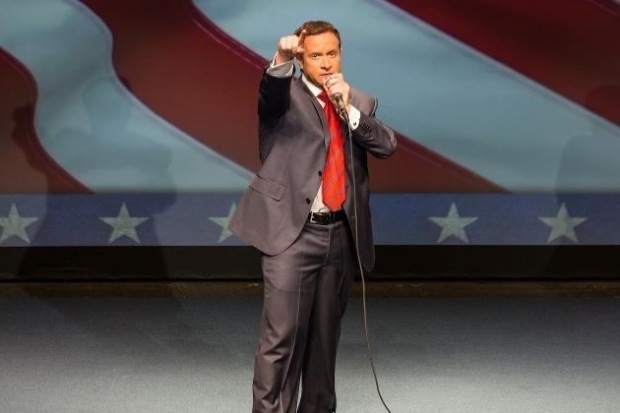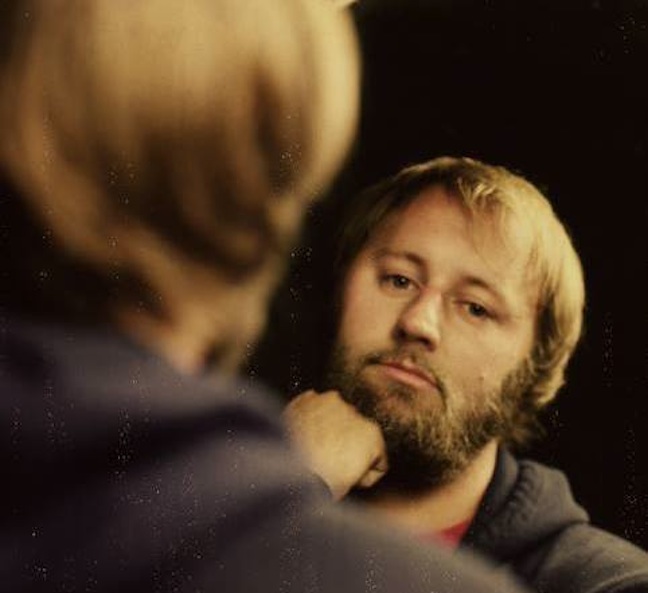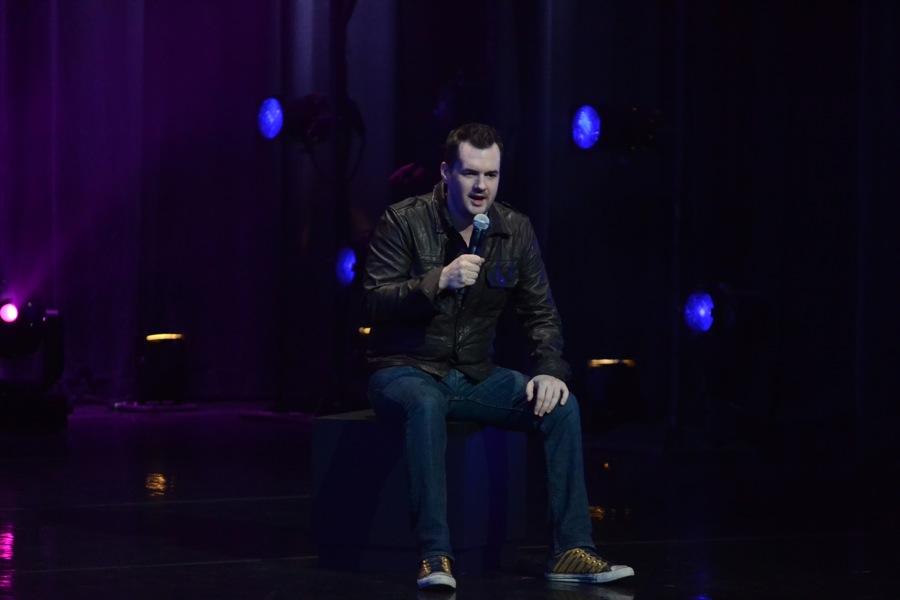When you talk about people who live up to the title of this site, you have to consider that Paul Provenza is indeed a "comic's comic." With his longtime friend, Penn Jillete, Provenza produced the documentary, The Aristocrats, which got dozens of comedians on the record talking about and modifying a joke so inside that most other comedians didn't even know it existed.
In recent years, Provenza also has hosted a live comedian talk show at Montreal's Just For Laughs comedy festival that has begat a TV series this summer on Showtime called The Green Room. He's also interviewed dozens of comedians for a book he collaborated on with photographer Dan Dion called ¬°Satiristas!, which came out last week. You can open it up just about anywhere and find a lively discussion between Provenza and a famous (or should-be famous) comedian about what it's like to tell truth to power. The book tour has brought him to New York City today, with a show and book signing tonight at Gotham Comedy Club. He has more signings and performances later this month in the San Francisco Bay Area.
Let's watch a couple of previews of Provenza's TV show, then talk to him about both the show and the book!
First of all, let's get the meta weirdness out of the way up top. Because here I am, a former comedian who interviews comedians, interviewing a comedian who interviews comedians. "What happens now is we actually enter the world of quantum comedy where a comedian can be a comedian and an interviewer of comedians at the same time, depending upon who's reading it." What if a comedy nerd reads this? "That'll knock the world off its axis. But you can read about it all in my new book, Schrodinger's Cat in the Hat."
Let's talk about the TV show first. How much were you actively trying to re-create the vibe you've had with your live shows in Montreal, and how much were you just going with the flow? "Totally. The one thing we wanted was the feel. We didn't know the look, or the design or any of that…We wanted to capture that feeling of being in that kind of room. Spontaneous. Unpredictable and really energetic. We shot it in a very different kind of way. I've always been frustrated that comedy has always had to adapt to the medium of television. Nobody tried to adapt the medium of television to comedy. Nobody gave that a shot. It's all jazz, but it's shot like news and sports."
The show opens right in the middle of the conversation, instead of with a traditional introduction. That was all part of that plan? "We wanted to strip away all the trappings of conventional TV shows. We wanted it to feel like you're hanging out with these comedians. You're already there. It's about those people hanging out. They're not hanging out for your sake. That's the vibe we wanted to create. It's not being done to please you. So it's not trying to provide an answer to Comics Unleashed, or even Tough Crowd?"It is not like Comics Unleashed. For any number of reasons."
After we joke about several of those reasons, I decide to get us back on track.
As far as Satiristas! goes, how much emphasis was placed on ordering the interviews in the book? I can see how and why you'd save George Carlin for last, but how did you decide to put Billy Connolly first? "That was pretty challenging. It was like dominos. Every time we edited one piece and imported something else instead, the whole chain of dominos started to fall. Because it's just slices of conversations. They all kind of flow from one another. You have all of these different and distinct voices swimming together. The order of it was really challenging.
"If you read Billy's piece, it's kind of like an overture. Because Billy talks about the experience of being a comedian. He talks about being a conductor of laughs. It seems like Billy's conversation seemed to be more about the joys of being a comedian, being particularly related to the mechanics of being a comedian, and what that process is like for him. No matter what anybody else says (in the book), it's all on top of that. Like Greg Giraldo talks about starting out and being able to crush, and now he feels like he's being more interesting and people are listening to him more. It all harkens back to what Billy says about being in front of an audience." Did it matter at all that you were opening the book with someone who was a so-called foreigner and not an American? "No. The bulk of his work has been in America for some time now…and the message is universal."
You can read an excerpt from the book in which Provenza talked with Conan O'Brien, reprinted in GQ.
I have to say I was surprised when I first opened to the middle of the book to find you included an interview with Jay Leno, who most comedians — and anyone else — might not consider among our most pure satirists. The interview is revealing in its own ways. Why did you even include him? "The reason Jay is in the book is because we talked to him specifically about his choice not to take a stand. He is one of the biggest comics in America. He talks to the largest audience in TV in America, and he does a nightly monologue. So we could address: These are the circumstances of your life. Why do you make the choices that you make? And I think he addresses them all. And you walk away from it thinking, he sounds like the All-American values. His point of view is not a stupid one. You think I've been judging him. He's been getting shit for this Conan thing, but he's really been a corporate employee. Jay has played by the rules. He's been the good little soldier. And when you do that, you'll end up looking lke a dick, because the system sucks."
"There are a lot of conflicting voices in the book. A lot of people don't agree on political correctness. A lot of people don't agree on certain social issues. One of those issues of discord is Jay Leno. I love that everybody gets a say. That's really what the book is about. It's about discourse, it's about speaking your mind. It relates as a bit of a meta-statement. This is America. Everybody's got an opinion about something, but nobody's really talking about it."
How much has this process, talking to comedians for print or for television, changed your own views about the importance of comedy? "It didn't really change my opinion of comedy. I don't think I learned anything new about comedy. I was struck repeatedly, that it's much more complicated than regular people know. I had no idea really how much of a thinker Roseanne is. I'd always thought of her as someone who said things to be shocking, and that would be that. But she really thinks a lot. I argue a lot with Janeane Garofalo, and she always gets me sitting back and thinking, oh, I need to think about this some more."
Can you be a thinker in comedy and still be successful, though? Or do you need to be more about broad strokes to reach a mainstream audience? Provenza says of the latter: "They're hititng all the notes and they're dong the Mariah Carey bullshit…it's Celine Dion…it's very crafty and technical. But when people are really talking from the heart, it's really nuanced. It touches you more than just making you laugh
and then when you have people talking about social issues, it becomes multi-layered."
One of my friends talks about those other comedians as 'whimsies.' Do you feel like they're doing something lesser than the Satiristas you write about? "I just came back from Melbourne, where they really love their whimsies. There's a place on the shelf for that. I like cotton candy. I like monster truck shows, and I like the opera. But the stuff that's most compelling, that touches me, that's more than a laugh. Carlin, who I had the honor of being able to talk with in his final weeks, it's not just that it's funny. There's something else happening to me here. My worldview is changing. my mind is being played with. A great laugh that's just on its own is fantastic. To champion the other, is not to minimize one. But in terms of writing something, to create something with nuance…that's challenging for anyone to hear. When you see somebody who's just heroic in some way shape or form. The guy who wins the gold in the Olympics. the guy who does the impossible. The guy who solves the problem in your cubicle that you couldn't solve for two weeks. It makes you go, why can't I do that? When I discovered Carlin, it was oh my god, it opened up the possibilities for me. I watch Louis CK, and I wonder if it's too late for me to apply for law school. I watch him getting funnier and funnier, and smarter and smarter, revealing such intimacies, it's just like Pryor and Carlin. Am I not talented? Am I a lazy fuck? That's where comedy as an art form gets really interesting to me. And then there are people who are merchants, who are just putting out product."
Does it matter what path a comedian takes to success, then? "It all depends on your personal definition of success? How many houses do you need? How many fancy cars do you want? Then you're top 40, Britney Spears, and you'll have to churn out Britney Spears type of shit. But if you're Tom Waits, then you don't have to sell as many records. Then you have people like Seinfeld, who could be true to himself, be exactly who he is, not compromise, and talk to this huge population. He's just lucky that being true to himself strikes a chord with a massive number of people. The 'Blue Collar' guys are still the biggest comics in America. That doesn't mean Lewis Black and Jon Stewart and Stephen Colbert aren't as successful as they are."
Well, it's not as if Seinfeld is being a satirist, though. Isn't he one of those merchants? "Jerry is not a guy in his personal life who wears his life on his sleeve. He's not very revealing
for me. If I wanted that many people to like me, I'd have to pretend to be someone other than who I am. On the flip side, you've got guys like Chris Rock, Doug Stanhope, Joe Rogan. You've got guys who aren't trying to hit a mainstream audience. They don't play by the rules. They're iconoclasts. They're rowdy, they're subversive, but they find their audience. Ultimately it boils down to being who you are, and now you can do that on the Internet. It used to be you had to do the Tonight Show to play to 25 million people to find your core fan base of 100,000. Now there's no excuse, because it's much easier to find your crowd now."
With all of the various ways that comedians are becoming famous on the Internet and/or TV, do you feel like we're in, or heading into, a repeat of the comedy boom of the 1980s? "I don't think we're repeating it. We're seeing some of the energy of it again. I think it's more exciting now. It's more fractionalized. We're seeing a lot more alternative venues. We're seeing a lot more different types of people. I think it's a more expansive style of palettes. The boom of the 80s was really driven by corporate interests. Get as many people through the doors as possible. Interest in comedy, output in comedy has definitely expanded, and that's like the boom. For better and for worse
what happened in that first boom was the demand outstripped the quality of the supply. Today you can really target your own audience. Back then you had to go through those same clubs that everybody else went through. Now there's a million different pathways. There's no template anymore. Used to be you worked the clubs. You do a TV spot. Your price goes up in the clubs. You go on tour. You open up for bigger names. There's as many different paths. Look at Liam Kyle Sullivan. Look at Reggie Watts. What does he do? He's awesome. You don't have to play by anybody's rules. You don't have to adapt to some generic idea of what to do."
It has been said by others, I think Chris Rock among them recently, that stand-up comedian is not a young person's game. Now that you've gotten plenty of perspective and age on it, do you agree?Are young stand-ups just wasting their time, or is there room for them? "It's possible but it's rare. If you're a thoughtful and sentient person, it really takes a while to be confident and secure. Most of what young comics do in stand-up is flounder around for a while. It's like Harry Potter. You have all of this magic but you keep knocking shit over and falling off of the broom. What do you care about? What are your values?What is your art? That's the artist's struggle. Because as you grow up, you change…if you're really an artist..that's going to have to grow and change, too."
Does that mean your advice for a new comedian is different now than it might have been before? Or would you still say the typical thing, which is stage time, stage time, stage time? "No, it is about that. You can talk about driving all you want. you have to get behind the wheel. (At a certain point), it becomes muscle memory. That's number one. What makes you a great artist is an expansive world view. A desire to get bigger and bigger as a human being. You know what, take a day off and go to the fucking museum. Just sit and see things that people created that belong in a museum. Experience what artists do. Experience what it takes for art to move you. More of a human evolution is part of doing stand-up that most people don't think of. Richard Pryor, his life was pretty fucking complicated and intense, and he had to face some real challenges. You have an idea that some of these people are damaged. Oh, yeah, some people call all comedians are damaged. But really, people are all damaged people. It's just comedians OWN it. To me, (Satiristas) it's a self-help book. I don't know how you can't read that and think, whatever fucked me in life, I need to face it and deal with it. Do my own work on my barometer. Ultimately, it's a book about speaking your mind, speak the truth. For some people that's a conscious process. For others they don't really think about it."
"One thing we dream of is that Satiristas! can be idefniteed with subversives, transgressive comedy. If you're somebody who wants that, we're hoping we can do shows with people who general audiences have never heard, who can be exposed to this cool comedy. There's some huge audiences for these kind of people, if only that audience could find them."



